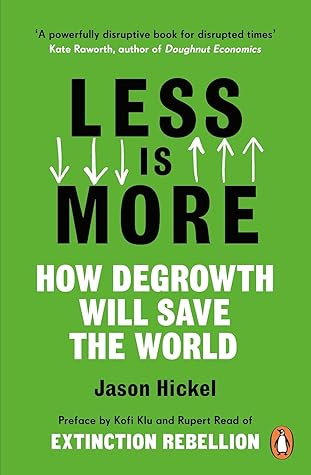More on this book
Community
Kindle Notes & Highlights
We normally think of capitalism as a system that generates so much (just consider the extraordinary cornucopia of stuff that’s displayed on television and in shopfronts). But in reality it is a system that is organised around the constant production of scarcity. Capitalism transforms even the most spectacular gains in productivity and income not into abundance and human freedom, but into new forms of artificial scarcity. It must, or else it risks shutting down the engine of accumulation itself. In a growth-oriented system, the objective is not to satisfy human needs, but to avoid satisfying
...more
If scarcity is created for the sake of growth, then by reversing artificial scarcities we can render growth unnecessary. By decommodifying public goods, expanding the commons, shortening the working week and reducing inequality, we can enable people to access the goods that they need to live well without requiring additional growth in order to do so.
As Henry Ford put it in the 1930s: ‘It is perhaps well enough that the people of the nation do not know or understand our banking and monetary system, for if they did I believe there would be a revolution before tomorrow morning.’
It’s not ‘human nature’ that’s the problem here. It’s that we have a political system that allows a few people to sabotage our collective future for their own private gain.
our ‘democracies’ are not actually very democratic at all. As income distribution has grown increasingly unequal, the economic power of the richest has translated directly into increased political power. Elites have managed to capture our democratic systems.
In 2010, $3.55 billion was spent on lobbying, up from $1.45 billion in 1998.58 And it pays off: one study found that money spent on lobbying the US Congress earned returns of up to 22,000% in the form of tax breaks and profits from preferential treatment.
As a result of political capture, the interests of economic elites in the US almost always prevail in government policy decisions even when the vast majority of citizens disagree with them. In this sense, the US resembles a plutocracy more than a democracy.
In Britain, three companies control over 70% of the newspaper market – and half of that is owned by Rupert Murdoch.63 In the US, six companies control 90% of all media.64 It is virtually impossible to have a real, democratic conversation about the economy under these conditions.
The world’s richest economies almost always get their way when it comes to crucial decisions about the rules of the global trade system, while poorer countries – those that have the most to lose from ecological breakdown – are routinely overruled.
We have long been told that capitalism and democracy are part of the same package. But in reality the two may well be incompatible. Capital’s obsession with perpetual growth at the expense of the living world runs against the values of sustainability that most of us hold. When people are given a say in the matter, they end up choosing to manage the economy according to steady-state principles that run counter to the growth imperative.
capitalism has a tendency to be anti-democratic, and democracy has a tendency to be anti-capitalist.
In 2016, an international team of scientists presented the biggest-ever database on forest regrowth in the New World tropics. They found that across ecosystems, from wet forest to dry forest, it takes an average of only sixty-six years for a forest to recover 90% of its old-growth biomass, completely naturally. All you have to do is leave it alone.
Whatever one might think of animism, one thing is certain: it is deeply ecological. In fact, it anticipates the core principles of ecological science that lie at the heart of the discipline today, which can be boiled down into a single phrase: everything is intimately interconnected;
Descartes’ ideas had no grounding in empirical evidence, but they became popular among European elites in the 1600s because they bolstered the power of the Church, justified the capitalist exploitation of labour and nature, and gave moral licence to colonisation.
Spinoza’s teachings upended the core tenets of religious doctrine, and threatened to pry open difficult moral questions about the exploitation of nature and labour.
Europe faced a fork in the road. They had two options: the path of Descartes or the path of Spinoza. With the full backing of the Church and capital, Descartes’ vision won out. It gave legitimacy to the dominant class forces, and justified what they were doing to the world. As a result, today we live in a culture shaped by dualist assumptions.
Ironically for a school of thought that was once considered the height of Enlightenment science, dualism ended up suffering a tremendous defeat at the hands of science itself.
Studies in Chicago, Baltimore and Vancouver have all discovered that neighbourhoods with higher tree cover have significantly fewer crimes, including assault, robbery and drug use – even when controlling for socio-economic status and other confounding factors.


